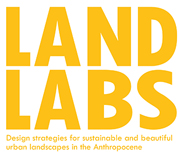Training
The LANDLABS training programme aims to give each individual doctoral candidate specific knowledge, experiences and methods needed to seek a career in international, inter-sectoral or inter-disciplinary fields related to landscape architecture, urbanism, spatial planning, architecture or geography after a completed PhD.

LANDLABS Organisational training scheme

LANDLABS Organisational training scheme
Overall Training Objectives:

Core research skills and scientific training:
– Enhance critical thinking regarding existing theories on Anthropocene Landscape, and gain a deep understanding of the practical aspects and design potentials of this field.
– Develop a specific research niche, theory or perspective that contributes to the field.

Advanced/Additional scientific training and research skills
– Acquire advanced analysis skills and excellent knowledge in various research methods, including research-through-design (RtD).
– Cultivate systematic thinking skills and problem-solving strategies in regard to their landscape laboratories and site-related research in inter- and transdisciplinary settings.

Transferable and complementary skills training
– Learn to integrate knowledge from inter- and transdisciplinary backgrounds into research.
– Enhance collaborative and management skills on negotiation, communication and mediation through practice- and site-related work with diverse actors of academia, industry, government, and society.
– Gain knowledge on presentation techniques and dissemination strategies.

Open Science related training modules
– Promote a culture of open science in accordance to the MSCA-NET Policy brief, through open publication, open science and site-related participation and co-creation processes.

Gender and diversity in R&I
– Learn to strongly value and support the inclusion of diverse groups, and apply gender equality aspects and policies to their research in accordance to GEP policies.

